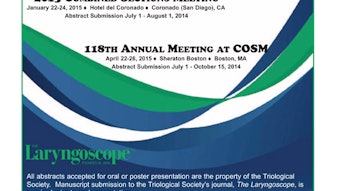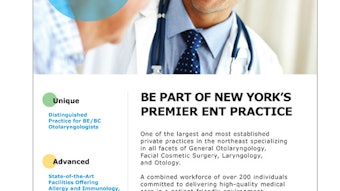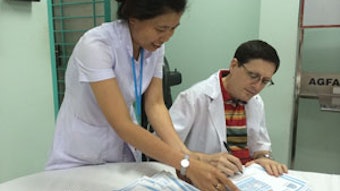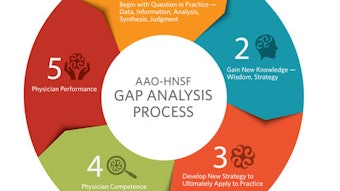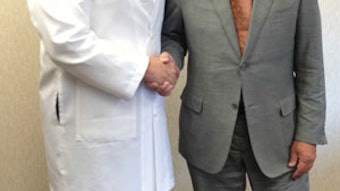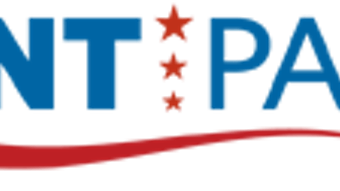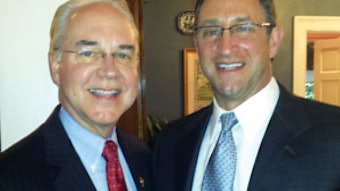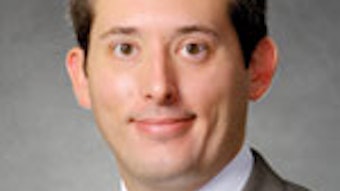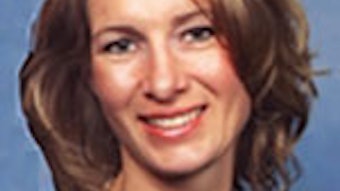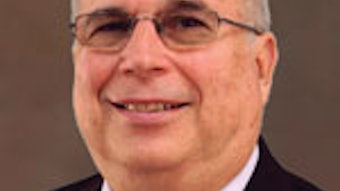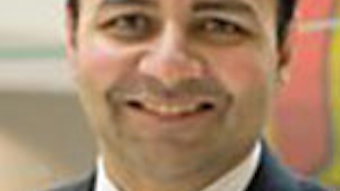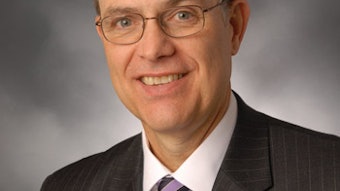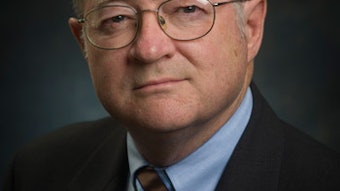Cameroon: A Model of Sustainability
Daniel Q. Sun, MD The red earth of Africa gripped me. It seemed to be everywhere—coating banana leaves larger than umbrellas and dusting roadside stands selling grilled goat. This was the dry season and we were in Cameroon. The fine red dust followed us from the south, where we landed, to the northwest—a place called Mbingo, situated in the Cameroon mountains that we would call home for the next two weeks. By working at the Mbingo Baptist Hospital (MBH), our mission was to provide otolaryngologic and, specifically, head and neck surgical training to general surgery residents there. My experience, however, was remarkable in so many ways. Shortage of health professionals is a pervasive problem in developing countries such as Cameroon, which has fewer than 30,000 doctors, nurses, and midwives per 10 million people according to a recent article in the New England Journal of Medicine. Subspecialty care is almost non-existent and general surgeons are called upon daily to do everything under the sun. Surgeons at MBH move from drilling burr holes for evacuation of a subdural hematoma in one patient to a C-section in another. Our team, led Wayne Koch, MD, has established a longitudinal partnership with the general surgery residency program at MBH and Everistus Acha, MD, a Cameroonian otolaryngologist, to provide head and neck surgical training to general surgery residents training at MBH. During the course of two weeks, we worked with Steve Kyota, MD, who is a general surgery resident in his third year of training, to perform nearly 40 operations, including five mandibulectomies, five maxillectomies, and 11 thyroidectomies. While it was gratifying to put our technical expertise to work, the greater impact lies in our ability to transfer our expertise into the hands of people like Dr. Kyota, who will hopefully go on to serve the communities around him. Indeed, during the course of our short time there, his progress in gaining a more in-depth appreciation for the anatomy, soft tissue skills, and principles of head and neck surgery was evident. In addition, we delivered educational lectures on airway management and physiological principles of hearing and balance. Dr. Acha’s expertise also allows us to be confident that we are leaving our post-operative patients in good hands, with an expert who will be able to monitor their progress and treat complications that arise. In addition to our clinical and educational projects, we also successfully carried out a pilot study on the prevalence of otitis media with effusion (OME) in the local pediatric population. After screening more than 80 children between the ages of 3 and 11 using otoscopy and tympanometry, we found the prevalence of chronic otitis media with effusion to be only about 3 percent, despite limited access to primary and tertiary care that renders most cases of otitis media and its complications unrecognized and untreated. Our findings stand in contrast to previous epidemiology studies in other developing regions of the world (but never in West Africa) that have identified rates of OME to be as high as 15 percent. As we expand our collaboration in Cameroon, we intend to build on studies such as this to investigate the differential burdens of disease and identify epidemiological and biological factors that will expand our understanding of the otolaryngologic disease processes we encounter each day. By working with local partners, focusing on building capacity through education and training, and developing avenues of research, we are excited about our efforts toward building a sustainable collaboration to advance subspecialty care in Cameroon. For young physicians in training such as myself, it also makes for a profound experience in personal and professional development, as I look outward at the inspirational community of people that have gathered in a beautiful village in the northwestern mountains of Cameroon to meet the challenges of building a healthcare system, and inward at what my patients have taught me about the indomitable human spirit and dignity that are at the core of my profession. Trip information: Name of training program: Department of Otolaryngology–Head and Neck Surgery, Johns Hopkins University School of Medicine Mission to: Mbingo, Cameroon Date of travel: February 6-21, 2014 Sponsoring organization: Department of Otolaryngology–Head and Neck Surgery, Johns Hopkins University School of Medicine, AAO–HNSF Humanitarian Travel Grant, Cameroon Baptist Convention Supervising Otolaryngologist: Wayne M. Koch, MD Local contact and hospital: Dr. Everistus Acha, Mbingo Baptist Hospital
Daniel Q. Sun, MD
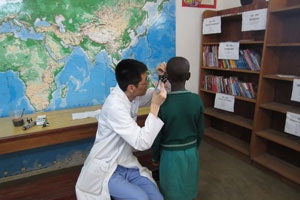 Conducting an otitis media with effusion screening study at a local elementary school.
Conducting an otitis media with effusion screening study at a local elementary school.The red earth of Africa gripped me. It seemed to be everywhere—coating banana leaves larger than umbrellas and dusting roadside stands selling grilled goat. This was the dry season and we were in Cameroon. The fine red dust followed us from the south, where we landed, to the northwest—a place called Mbingo, situated in the Cameroon mountains that we would call home for the next two weeks. By working at the Mbingo Baptist Hospital (MBH), our mission was to provide otolaryngologic and, specifically, head and neck surgical training to general surgery residents there. My experience, however, was remarkable in so many ways.
Shortage of health professionals is a pervasive problem in developing countries such as Cameroon, which has fewer than 30,000 doctors, nurses, and midwives per 10 million people according to a recent article in the New England Journal of Medicine. Subspecialty care is almost non-existent and general surgeons are called upon daily to do everything under the sun. Surgeons at MBH move from drilling burr holes for evacuation of a subdural hematoma in one patient to a C-section in another. Our team, led Wayne Koch, MD, has established a longitudinal partnership with the general surgery residency program at MBH and Everistus Acha, MD, a Cameroonian otolaryngologist, to provide head and neck surgical training to general surgery residents training at MBH. During the course of two weeks, we worked with Steve Kyota, MD, who is a general surgery resident in his third year of training, to perform nearly 40 operations, including five mandibulectomies, five maxillectomies, and 11 thyroidectomies.
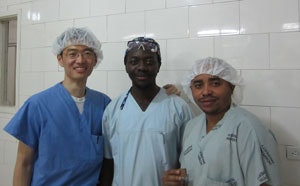 Training of African general surgery residents in head and neck surgery. Pictured left to right: Dr. Sun, Honore Liale (ENT nurse), and Dr. Kyota.
Training of African general surgery residents in head and neck surgery. Pictured left to right: Dr. Sun, Honore Liale (ENT nurse), and Dr. Kyota.While it was gratifying to put our technical expertise to work, the greater impact lies in our ability to transfer our expertise into the hands of people like Dr. Kyota, who will hopefully go on to serve the communities around him. Indeed, during the course of our short time there, his progress in gaining a more in-depth appreciation for the anatomy, soft tissue skills, and principles of head and neck surgery was evident. In addition, we delivered educational lectures on airway management and physiological principles of hearing and balance. Dr. Acha’s expertise also allows us to be confident that we are leaving our post-operative patients in good hands, with an expert who will be able to monitor their progress and treat complications that arise.
In addition to our clinical and educational projects, we also successfully carried out a pilot study on the prevalence of otitis media with effusion (OME) in the local pediatric population. After screening more than 80 children between the ages of 3 and 11 using otoscopy and tympanometry, we found the prevalence of chronic otitis media with effusion to be only about 3 percent, despite limited access to primary and tertiary care that renders most cases of otitis media and its complications unrecognized and untreated. Our findings stand in contrast to previous epidemiology studies in other developing regions of the world (but never in West Africa) that have identified rates of OME to be as high as 15 percent. As we expand our collaboration in Cameroon, we intend to build on studies such as this to investigate the differential burdens of disease and identify epidemiological and biological factors that will expand our understanding of the otolaryngologic disease processes we encounter each day.
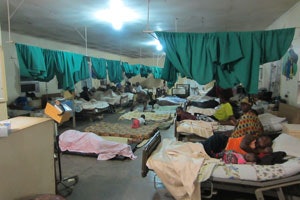 Surgical ward at Mbingo Baptist Hospital.
Surgical ward at Mbingo Baptist Hospital.By working with local partners, focusing on building capacity through education and training, and developing avenues of research, we are excited about our efforts toward building a sustainable collaboration to advance subspecialty care in Cameroon. For young physicians in training such as myself, it also makes for a profound experience in personal and professional development, as I look outward at the inspirational community of people that have gathered in a beautiful village in the northwestern mountains of Cameroon to meet the challenges of building a healthcare system, and inward at what my patients have taught me about the indomitable human spirit and dignity that are at the core of my profession.
Trip information:
Name of training program: Department of Otolaryngology–Head and Neck Surgery, Johns Hopkins University School of Medicine
Mission to: Mbingo, Cameroon
Date of travel: February 6-21, 2014
Sponsoring organization: Department of Otolaryngology–Head and Neck Surgery, Johns Hopkins University School of Medicine, AAO–HNSF Humanitarian Travel Grant, Cameroon Baptist Convention
Supervising Otolaryngologist: Wayne M. Koch, MD
Local contact and hospital: Dr. Everistus Acha, Mbingo Baptist Hospital
